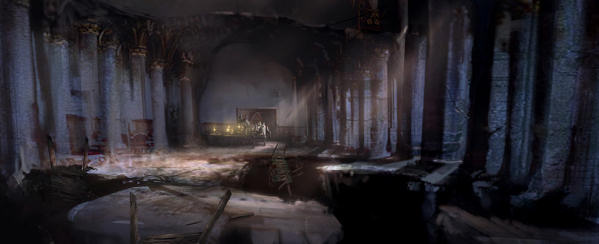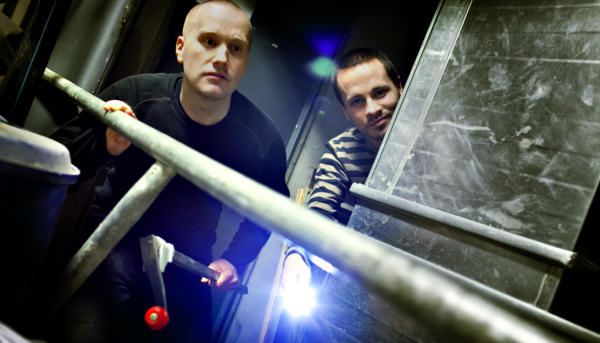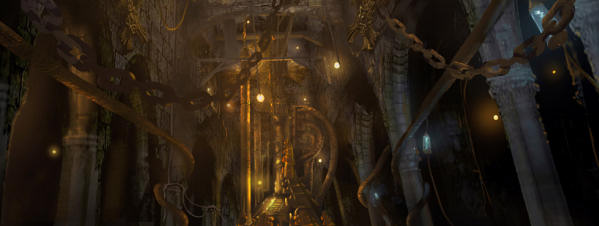Frictional Games On Penumbra And The Future
We've been stalking Frictional Games, the developers behind the indie horror series Penumbra, for a while now, trying to find out details about their new project. Along the way we asked them to look back at the process of developing Penumbra, what lessons were learned, which publishers were hated, and why horror is their passion. In a frank interview, two of Frictional's four-man team, sound director Jens Nilsson and lead programmer Thomas Grip, talk us through the company's past, all the while dropping a few hints about what's next, before giving us the first solid details of their forthcoming, castle-based horror game.
RPS: When you look back at the Penumbra series, what are your main thoughts?
Frictional: What a mess! It's a mixed bag of thoughts. You think about the original publisher and the problems they created, how their misbehaving led to so much extra work and ripples effects. Not only for us having to redesign the game and rethinking how to do many things, but also for all their “partners” and so on that made plans and arrangements to do three titles, and ending up with them bastards ruining it for everyone. At the same time it was a very useful experience and a great crash course in numerous issues and areas, quite good to have it all over and done with in such an early age of a new company!
We had planned and built on being effective and dynamic, in order to be able to develop advanced games with only about four people, but with the issues we had some had to leave to get more reliable jobs, and we have to learn to become even better at managing the development with an always changing reality.
But it's also pure enjoyment looking at the series. We got some sample boxes of the new Collection edition last week and looking at all the games together is damn nice. Having a box where you came up with the contents, developed it, managed to survive and continue development, tried many ideas and implemented visions of horrors unheard of, and so on. Lots of good stuff and lots of experience that we now can put to good use when working on the new project.
RPS: How have you found the development process, balancing creating and evolving an engine, alongside developing games?
Frictional: The engine and games has been so linked together that it has been quite a smooth process. It's been very useful to have our own engine as it has been possible to fix issues on short notice and create the features required by the game.
It's rather much more of a hassle combining the development and creative side of the company with the administrative tasks. There is a huge amount of time that is spent on servers, emails, documentation, phone calls, meetings, legal issues, accounting and so forth. Even if you have a publisher that takes care of the PR, because it is your game most roads leads back to Frictional. In the end it is us that needs to provide the information and rough media that the publisher needs to do their part making great PR.
We did have months when we did two projects at the same time, half of the company (two...) worked on Requiem most of the time and the other half (two, in case you missed it...) worked on the engine and tools for the upcoming project. At times that was quite stressful for us, being so few and yet doing two projects simultaneously. After those five months it felt like going on vacation when we only had on project to concentrate on again!
RPS: Are you now in a more secure position to make the game, after the confusion over the 3-part/2-part nature of Penumbra?
Frictional: A bit. We don't have much room for errors or prolonged periods of funding-free development, and depend on having partners to maintain the company and production flow. We still have great creative freedom and, this time, confidence (within the company as well as from external parties) to do a fully fledged game and avoid all the cutting we had to do with Penumbra. Because of this we plan to do a more complex game with larger scope, meaning a more risky project. Hopefully things will not crash and burn so that we can deliver to the gamer a unique experience that makes Penumbra look like a pathetic attempt at a game.
RPS: A lot of people had trouble categorising the Penumbra series, trying to force them into a genre. Do you think genres are helpful, or do they inhibit imagination?
Frictional: A necessary evil? Genres are helpful for the end user, you get the urge for something and the genre-system will most of the time help you find a place to start looking for the next game to play. As our perception of what game we created with Penumbra didn't really match that of the press (survival horror vs adventure) it got quite confusing at times. In truth it resulted in us spending time on discussing ways to communicate how to best describe the game to fit a genre we believed would best represent the correct gaming interest. So much that it has led us to a simple conclusion for the next project, it is a survival horror game, end of story. This is what we will communicate and this is what we are concentrating on when creating the game, a mantra that echoes in the back of our minds.
RPS: The story in Penumbra was given a lot of prominence, with action taking an increasingly smaller role as the series progressed. Do you see this as the direction you're planning to continue in, making story-based games rather than action-based?
Frictional: We definitely believe in putting the story at a central position in the game, to tell something intriguing to drive the player forward. We have had the goal to try and tell as fluent a story as possible, to allow the player to control how much story to consume, and to maximize story and gameplay connections so that the two go seamlessly together. For the next project we try to improve on this as much as possible, to give all the players a good main story, that is told as much as possible with the player on the go so he does not have to stand around or passively watch a cutscene. At the same time we will put in layers of extra story and details, that is available for the player to find by searching and being thorough when playing. The next game will also be more action-oriented than Penumbra. Not to say that it's a game about action, but we are going to have a bit more combat oriented gameplay and action elements than seen in the Penumbra series.
RPS: What lessons have you learned from the Penumbra series that you'll apply as you go forward?
Frictional: Many general experience lessons, it's hard to pinpoint exactly what. But we are doing quite a lot of things differently for the next project. Everything from making sure we have a better core gameplay, to doing a proper and extensive prototyping before we begin the actual development of the game. In Penumbra, almost all of the gameplay came from specifically crafted setups, which took a long time to develop. For the next project we are making sure there is a gameplay that will be enjoyable with less work, and only certain specific elements will be crafted to give areas a unique extra bit of gameplay. We are also more experienced when it comes to crafting a story, and have spent a lot of time writing background information and discussing the design of the story elements.
RPS: What engine will you be using for the next game? Are you upgrading the previous, or starting afresh?
Frictional: It's a revamped and much improved version of the old engine. Most of it has been cleaned out and replaced with new technologies or updated versions of them. There is a huge improvement in overall stability, and a new quality of the engine now that really makes it a huge improvement for us. There has also been one additional programmer dedicated to the development of tools and editors, so the new engine comes with some great programs that will allow for the rest of the team to work very efficiently with implementing their content into the game. For example, the level editor and model editor is running directly in the engine making it possible for them to give a exact real time rendered version of how it will look in-game, saving a lot of time from the previous method of having to do changes to a level, saving it and then take it for a test run in the game or a viewer. The tools have also been designed to be stable and user friendly, with the goal to release it with the game so that users can use them as well. It won't be the easiest set of tools provided in a game ever, but it will definitely lower the bar quite a bit, in terms of map making, compared with the Penumbra series.
RPS: What can you tell us about your next project? What should we be looking forward to?
Frictional: Survival horror deluxe, so brutal that we can't talk much about it without sending this interview to PEGI first! Nah not really, it's a survival horror game for sure, set in the 18th century and we are going to continue exploring many of our ideas and hopes for how to develop the horror genre. Again the focus will be on psychological terror and not cheap scares and bucketloads of gore. We feel that we have a lot of ideas on how to tell a story and how to scare the player that we are going to try out in the new game. We believe that it is possibly to build up a much more tense atmosphere than in Penumbra and we will do our best to create a really unnerving and frightening experience.
RPS: Can you tell us anything about the story?
Frictional: The player will arrive at an old castle, having been sent on a strange assignment, and is not really sure why. At the castle he will feel strangely drawn to it, and from there all kinds of disturbing events will unfold. Our goal is to make the protagonist and player motivations as similar as possible, and with that make the player care more about the story and be more immersed.
RPS: So what is it about the horror theme that interests you?
Frictional: There are lots of interesting elements to work with when it comes to horror, as it is so much based on what you communicate to the player, and there are nice challenges for us all on how to do that. It's a popular genre, but not that crowded, and that makes it a great place for us to make a niche game that appeals to many, but can still be different from the competition. The horror genre is also one of the few, if not the only genre, where you put all the effort into creating emotions in the player. So much that you can at times neglect gameplay in order to create the best horror effect for the player to experience. It's really interesting to work with a theme that allows you to spend so much time thinking and designing around the goal to evoke feelings in people.
RPS: Any other juicy details?
Frictional: I'm afraid we cannot give any juicy specifics at this point. However, we feel that Penumbra was really just a kind of warm up for us, and that we have gained a lot of new knowledge from it. We plan on taking the new game to another level, and people who thought Penumbra was scary will have really hard time playing our upcoming game late at night!
The Penumbra Collection, a boxed version of all three Penumbra games (well, both and the add-on if you want to be fussy) is in the shops in Europe later this month, and is out in the US today. Here's the trailer:




